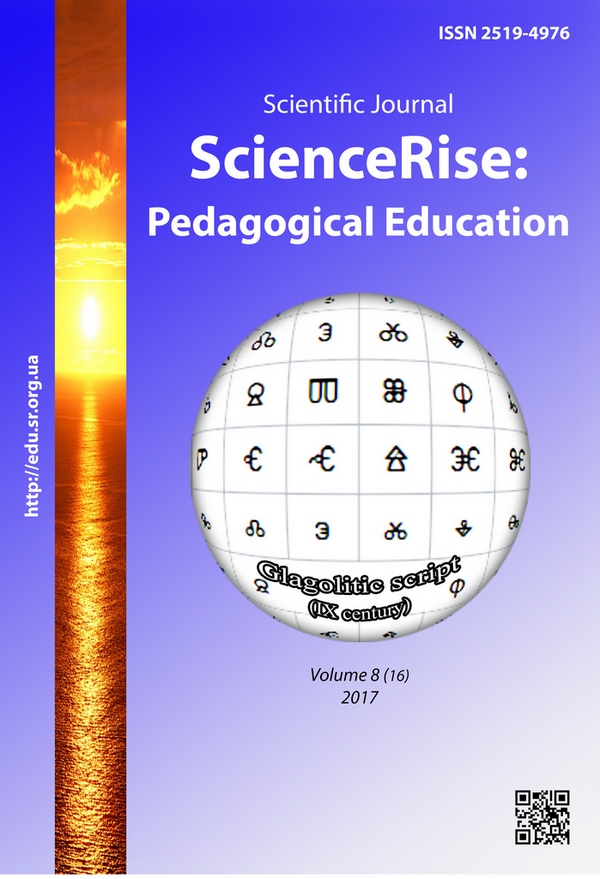Social networks as an integral and urgent mean of modern teaching at a higher educational establishment
DOI:
https://doi.org/10.15587/2519-4984.2017.109242Keywords:
media education, social network, students, informative and communicative technologies, studying processAbstract
Nowadays it is impossible to find a young person who has nothing to do with the Internet. It has inevitably burst in our lives. The global process of informational technologies development leads to total social networks usage. With different devices (smartphones, PCs, laptops, tablets etc.) young people can check in anytime and anywhere. That’s why to stay in touch with students a teacher has to provide innovative methods and means of teaching. Social networks are good examples of accessibility, moderateness, simplicity in communication and usage. They also provide wide range of opportunities not only to communicate with ease but to study, to be engaged in discussions, investigations, estimations, critical analysis provided by a teacher.
According to the newest research Facebook appeared to be one of the most used and popular social network in the world. Recently in Ukraine it is also getting more widespread. The communities formed in the web service help students to incorporate by their interests, skills or even educational subjects, get in touch with the problem raised by a teacher, to discuss it, to solve the given tasks
References
- Moroz, O. O. (2012). Media osvita u strukturi osvitologii [Media education in the structure of educology]. Ukrainian and Polish Annual Report. Part VI. Sociology, 1, 117–119.
- Arkhipova, T. L., Osipova, N. V., Lvov, M. S. (2015). Social networks as a means of learning process. Information Technologies in Education, 22, 7–18. Available at: http://ite.kspu.edu/webfm_send/809 doi: 10.14308/ite000516
- Shcherbakov, V. O., Shcherbyna, H. A. (2012). Sotsialna merezha dlia pidtrymky navchalnoho protsesu u VNZ [Social network for educational process support at a higher educational establishment]. Systems of information finishing, 8 (106), 159–162.
- Bykov, V. Yu. (2008). Modeli organizatsii system vidkrytoi osvity [Models of open educational system organization]. Kyiv: Atika, 684.
- Svietlorusova, A. V. (2011). Vykorystannia virtualnykh spilnot dlia rozvytku informatsiino-komunikatsiinykh kompetentnostei starshoklasnykiv [The using of virtual communities for informational and communicative competence development of senior pupils]. Scientific periodical of NPU named after M. P. Drahomanov. Sir. 5: Ped. science: realities and prospects, 28, 212–216.
- Chernenko, V. O., Romenets, Yu. V. (2011). Suchasnyi stan informatsiino-komunikatsiinukh tekhnolohii u svitovii pedahohichnii praktytsi [The current state of using web information and communication technologies within the world padagogical practice]. Informational technologies and means of teaching, 2 (22). Available at: http://journal.iitta.gov.ua/index.php/itlt/article/view/410
- Social Networks Services. Available at: https://sites.google.com/site/sdfghiuytfvbnm/
- Minchenko, O. (2014). Ukrainians on Social Networks: the New Yandex Investigation. Available at: http://watcher.com.ua/2014/08/21/ukrayintsi-v-sotsialnyh-merezhah-nove-doslidzhennya-vid-yandeksa/
- Duschenko, O. S. (2015). Perspektyvy vykorystannia sotsialnukh merezh v osviti [Perspectives of social networks usage in education]. Scientific youth-2015. Kyiv. Available at: http://internet-texnologyeducation.blogspot.com/2016/05/blog-post_5.html
- Goncharenko, S. U.; Holovko, S. (Ed.) (1997). Ukrainskyi pedahohichnyi slovnyk [Pedagogical vocabulary of the Ukrainian language]. Kyiv: Lybid, 374.
- Number of Social Media Users Worldwide from 2010 to 2021 (in billions). Available at: https://www.statista.com/statistics/278414/number-of-worldwide-social-network-users/
- Siemieniecki, В. (Ed.) (2007). Pedagogika medialna 1 [Pedagogy 1]. Warszawa: PWN, 337.
- Kravchenko, T. A. (2010). Stanovlenie setevoi paradigmy v epokhu postneklassicheskoi nauki [The formation of network paradigm at the times of afternewclassical science]. Intelekt. Osobystist. Tsyvilizatsiia, 8, 121–129.
- Leschenko, A. M. (2011). Sotsialnye seti kak mekhanism konstruirovania kommunikatsii v sovremennom obshchestve [Social networks as the mechanism of communicational construction in modern society]. Piatigorsk. Available at: http://www.dissercat.com/content/sotsialnye-seti-kak-mekhanizm-konstruirovaniya-kommunikatsii-v-sovremennom-obshchestve
- Lobovikova, O. O. (2011). Sotsialni merezhi yak fenomen informatsiinogo suspilstva [Socail networks a phenomenon of informational society]. Bulletin of the Lviv University. Sociological issue, 5, 154–160.
- Danko, Yu. A. (2012). Fenomen sotsialnykh merezh u konteksti stanovlennia i rozvytku merezhevoho suspilstva [The phenomenon of social networks as formation and development of network society]. Visnyk Mizhnarodnoho Slovianskoho universytetu. Seriia «Sotsiolohichni nauky», 15 (1/2), 53–59.
- Qualman, E. (2009). Socialnomics: How Social Media Transforms the Way We Live and Do Business. Hoboken: John Wiley & Sons, 288.
- Minchenko, O. (2016). 5,4 million of Ukrainian Citizens on Facebook: the Number of Ukrainian Users Gets Increasing Faster than in 2015. Available at: http://watcher.com.ua/2016/04/25/5-4-mln-ukrayintsiv-u-facebook-kilkist-korystuvachiv-v-ukrayini-pochala-rosty-shvydshe-nizh-v-2015-rotsi/
- Oleksiuk, N. V., Lebedenko, L. V. (2015). Vykorystannia elektronnukh sotsialnykh merezh u sotsialno-pedahohichnii roboti zi shkoliaramy [The using of electronic social networks in social and pedagogical work with pupils]. Informational technologies and means of teaching, 48 (4), 88–102. Available at: http://lib.iitta.gov.ua/10440/1/1273-4811-1-PB.pdf
- Kuchakovska, G. A. Zastosuvannia sotsialnykh merezh v navchalnii diialnosti studentiv [The using of social networks in students’ educational activities]. Available at: http://conf.iitlt.gov.ua/Images/Files/G_78_1417539443_file.Kuchakosvka_Soc_78_1417539443_file.mereszi%20v%20navchanny_78_1417539443_file.docx
- Ivashnova, S. V. (2012). Vykorystania sotsialnykh servisiv ta sotsialnykh merezh v osviti [The usage of social services and social networks in education]. Scientific notes NDU named after M. Hohol. Psychological and pedagogical sciences, 2, 15–17.
Downloads
Published
How to Cite
Issue
Section
License
Copyright (c) 2017 Yevheniia Protsko

This work is licensed under a Creative Commons Attribution 4.0 International License.
Our journal abides by the Creative Commons CC BY copyright rights and permissions for open access journals.
Authors, who are published in this journal, agree to the following conditions:
1. The authors reserve the right to authorship of the work and pass the first publication right of this work to the journal under the terms of a Creative Commons CC BY, which allows others to freely distribute the published research with the obligatory reference to the authors of the original work and the first publication of the work in this journal.
2. The authors have the right to conclude separate supplement agreements that relate to non-exclusive work distribution in the form in which it has been published by the journal (for example, to upload the work to the online storage of the journal or publish it as part of a monograph), provided that the reference to the first publication of the work in this journal is included.







